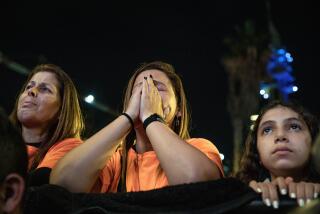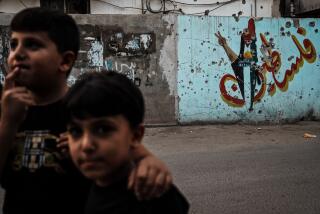Nowhere to Hide From Children’s Tough Questions on War
- Share via
One child wanted to know what a bomb is. Another wanted to know the meaning of torture. And an 8-year-old boy asked his father, “Why can’t we just kill Saddam Hussein? Why can’t we just drop a nuclear bomb?”
These are just some of the simple, but chilling, questions that parents have been asked this past week by sometimes frightened children who are grappling with the concept of war as they are deluged with television images of bombings and battle reports.
On Tuesday night, about 90 parents gathered at a North Hollywood synagogue to seek advice from professional counselors on how best to reply.
Many of the parents said they were torn by the conflicting desires to educate their children and to shelter them from the horrors of the war.
“The question is how much do you protect them and how much do you say,” said Dana Wexler, 37, mother of three.
When Wexler’s 8-year-old son asked the definition of torture, she told him that it meant to hurt, perhaps by breaking all their fingers. Later, she said, she wondered if she had said too much.
The boy’s father, Gary, 39, said he struggled to answer his son’s question about killing Saddam Hussein, torn by his own mixed feelings.
“I said to him something that was shocking to me. I said maybe we should,” Gary Wexler said. “I have always thought of myself as an anti-war person.”
When his son asked about the nuclear bomb, Gary Wexler said he explained to the boy, “There is only so far we can go. If we use a nuclear bomb it would rip the world apart.”
Judy Aranoff said that when her 6-year-old daughter asked if an Iraqi diplomat appearing on television was a “good guy or a bad guy,” she was loath to say that he was a bad guy.
“I told her, he might be a very good father, and a very good husband, but right now he just happens to be working for a very bad government,” Aranoff said.
The two psychologists at the discussion said that parents should explain the facts about the war and should honestly answer their children’s questions. But they said parents should limit bloody details to what they feel their children can handle.
“You are going to have to answer in some degree, but you don’t want to overwhelm them with the ugliness and devastating kind of information we know about what goes on behind those doors,” clinical psychologist Robert Scott said. “I don’t think that goriness and details are in their best interest.”
The psychologists said the best action parents can take is to drastically limit the amount of television war footage children watch, a sentiment echoed Wednesday by First Lady Barbara Bush, who said she knows from her own grandchildren that “it’s very scary” for them.
News reports and scenes of bombings can confuse children, psychologists said, because they do not provide explanations that youths can understand.
In addition, school psychologist Lynn Friedman Kessler said television coverage “makes the war look like a patriotic video game” and can glorify the use of violence without conveying any sense of the ethical questions war raises.
“These kinds of events give children the message that it is OK to use violence to resolve conflicts,” Kessler said.
The psychologists said that parents should try to explain to children the roots of the Persian Gulf conflict in a simple way and should share their own feelings about war and the use of violence.
“This is a good time to share your philosophy about morals, life, love and hate,” Scott said.
More to Read
Sign up for Essential California
The most important California stories and recommendations in your inbox every morning.
You may occasionally receive promotional content from the Los Angeles Times.













